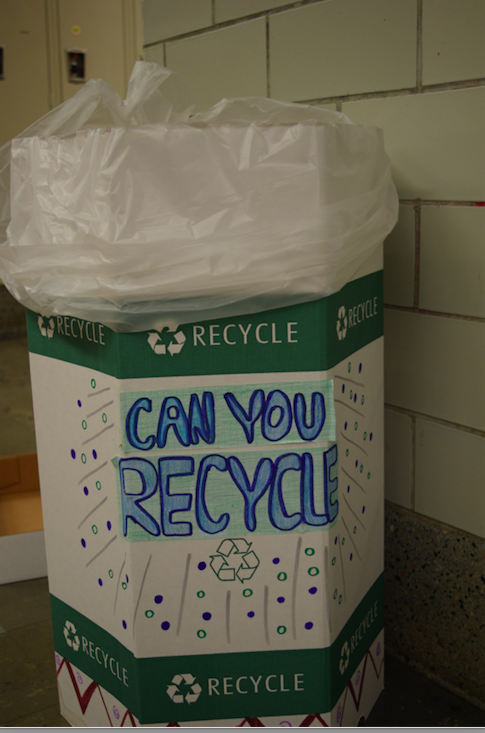Sustainability of new Lincoln campus at front of students’ minds
A decorated recycling bin is located inside senior hall. Many of these bins are spread out across the school to promote sustainability.
A recycling bin full of discarded school lunches, grocery bags, and used coffee cups, sits in a Lincoln classroom, waiting to be thrown away along with the trash.
Environmental sustainability is the ability to continue to exist while maintaining environmental quality and not depleting natural resources. Some factors of sustainability at Lincoln are how green the building is, how efficient and effective the recycling procedure is, and how active students and teachers are at improving sustainability.
According to the Portland Public Schools website, PPS procedure orders that “if there is too much garbage in recycling, it is disposed of as garbage.” PPS protocol says that glass, coffee cups, paper towels, napkins, unclean plastic bottles, and bottle caps cannot be recycled, but by a report observing Lincoln recycling bins, it is clear that this is not common knowledge. Bottle caps, plastic utensils, and coffee cups were collectively found in numerous Lincoln recycling bins placed around the school.
Junior Analicia Phillipot, who actively recycles bottles from recycling boxes and pulls them out of the trash bins from classrooms throughout Lincoln has also noticed this issue of students being unaware of what can be recycled.
“We could do more to educate what goes into the recycling and what can’t…because I often go through the recycling and there’s just like lunches thrown in there,” says Phillipot.
Not only is it important to make sure that recycling bins only contain things that are recyclable, but it is also important to make sure that the trash bins do not contain recyclables. Philipot actively collects “bottles and cans from the trash and recycling at Lincoln to make sure that it gets to the correct place.” She recycles between 140 and 280 cans a day and takes them from Lincoln to either Safeway or Target. She started this about a month or two into this school year, because she “noticed how much was being wasted and got really sad,” and “thought of the impact that she could make on the environment.”
The plans for Lincoln’s rebuild include goals regarding sustainability. According to an anonymous LHS Master Plan Coordinator (MPC) student member, the new Lincoln “should be a poster child for sustainability on any tour of the city.” The PPS Long Range Facilities Plan also says that “The District will seek to implement high-performance systems to achieve cost-effective energy, water, and waste solutions that provide flexible, adaptive learning environments to support student achievement,” as well as improving the curriculum to “increase student understanding and commitment to sustainable practices.”
Additionally, the new Lincoln building will be Leadership in Energy and Environmental Design (LEED) Gold certified, which, according to the PPS website, means that the school will be a green building that is sustainable, resilient, healthy and efficient.
Through these improvements to the new Lincoln, improved awareness of recycling at Lincoln, and students who are actively advocating to improve the state of the environment, Lincoln’s sustainability will be improved.

